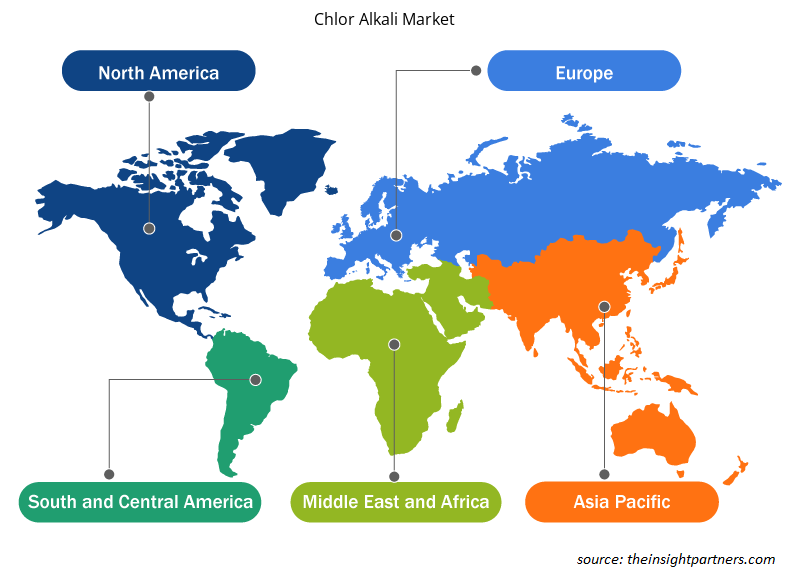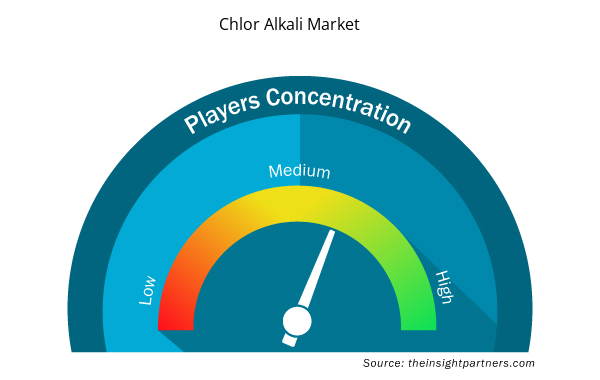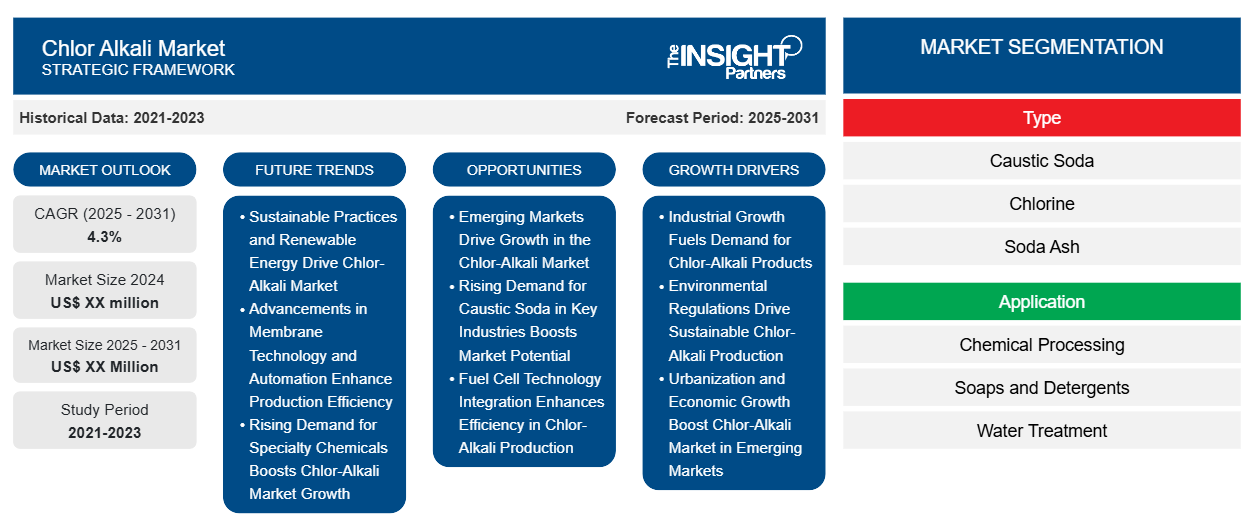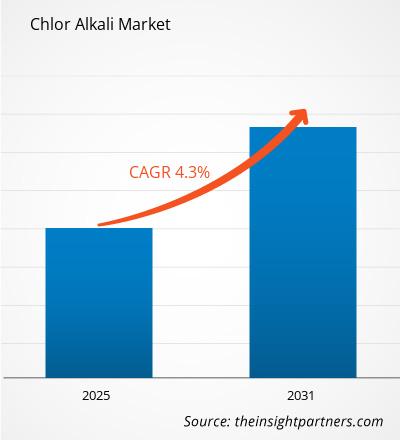Es wird erwartet, dass der Chloralkali-Markt von 2024 bis 2031 eine durchschnittliche jährliche Wachstumsrate (CAGR) von 4,3 % verzeichnet, wobei die Marktgröße von XX Millionen US-Dollar im Jahr 2024 auf XX Millionen US-Dollar im Jahr 2031 anwächst.
Der Bericht ist nach Produkttyp (Ätznatron, Chlor, Soda, andere) segmentiert. Der Bericht enthält außerdem Analysen basierend auf der Anwendung (chemische Verarbeitung, Seifen und Reinigungsmittel, Wasseraufbereitung, Papier und Zellstoff, Textilien, Lebensmittelverarbeitung und andere). Der Berichtsumfang umfasst 5 Regionen: Nordamerika, Europa, Asien-Pazifik, Naher Osten und Afrika sowie Süd- und Mittelamerika und wichtige Länder in jeder Region. Die globale Analyse ist weiter auf regionaler Ebene und nach wichtigen Ländern aufgeschlüsselt. Der Bericht bietet den Wert in USD für die oben genannte Analyse und Segmente.
Zweck des Berichts
Der Bericht Chloralkali-Markt von The Insight Partners soll die aktuelle Landschaft und das zukünftige Wachstum sowie die wichtigsten treibenden Faktoren, Herausforderungen und Chancen beschreiben. Dies wird verschiedenen Geschäftspartnern Einblicke geben, wie zum Beispiel:
- Technologieanbieter/-hersteller: Um die sich entwickelnde Marktdynamik zu verstehen und die potenziellen Wachstumschancen zu kennen, damit sie fundierte strategische Entscheidungen treffen können.
- Investoren: Durchführung einer umfassenden Trendanalyse hinsichtlich der Marktwachstumsrate, der finanziellen Marktprognosen und der Chancen entlang der Wertschöpfungskette.
- Regulierungsbehörden: Zur Regulierung von Richtlinien und Überwachungsaktivitäten auf dem Markt mit dem Ziel, Missbrauch zu minimieren, das Vertrauen der Anleger zu bewahren und die Integrität und Stabilität des Marktes aufrechtzuerhalten.
Chloralkali-Marktsegmentierung
Typ
- Ätznatron
- Chlor
- Soda
- Sonstiges
Anwendung
- Chemische Verarbeitung
- Seifen und Reinigungsmittel
- Wasseraufbereitung
- Papier und Zellstoff
- Textil
- Lebensmittelverarbeitung
- Sonstiges
Passen Sie diesen Bericht Ihren Anforderungen an
Sie erhalten kostenlose Anpassungen an jedem Bericht, einschließlich Teilen dieses Berichts oder einer Analyse auf Länderebene, eines Excel-Datenpakets sowie tolle Angebote und Rabatte für Start-ups und Universitäten.
- Holen Sie sich die wichtigsten Markttrends aus diesem Bericht.Dieses KOSTENLOSE Beispiel umfasst eine Datenanalyse von Markttrends bis hin zu Schätzungen und Prognosen.
Wachstumstreiber auf dem Chloralkalimarkt
- Industrielles Wachstum treibt Nachfrage nach Chlor-Alkali-Produkten an: Im Chlor-Alkali-Verfahren werden wichtige Chemikalien wie Chlor und Natronlauge hergestellt, die in vielen Industriezweigen eine wichtige Rolle spielen, darunter Zellstoff und Papier, Textilien und Wasseraufbereitung. Die zunehmende Industrialisierung und der Ausbau der Infrastruktur treiben die weltweite Nachfrage nach diesen Chemikalien an.
- Umweltauflagen fördern nachhaltige Chlor-Alkali-Produktion: Strengere Umweltauflagen fördern die Einführung von Chlor-Alkali-Produkten, die Nachhaltigkeitsziele erfüllen. Fortschritte bei den Produktionsmethoden minimieren Emissionen und Abfall und veranlassen die Industrie, diese umweltfreundlichen Optionen zu nutzen, was wiederum das Wachstum des Chlor-Alkali-Marktes unterstützt.
- Urbanisierung und Wirtschaftswachstum beflügeln den Chlor-Alkali-Markt in Schwellenmärkten: Die schnelle Urbanisierung und das Wirtschaftswachstum in Schwellenmärkten treiben die Nachfrage nach Chlor-Alkali-Produkten in die Höhe. Die wachsenden Bau-, Automobil- und Konsumgüterindustrien in Ländern wie Indien und Brasilien bieten Chlor-Alkali-Produzenten erhebliche Möglichkeiten, ihre Marktpräsenz zu stärken.
Zukünftige Trends auf dem Chloralkalimarkt
- Nachhaltige Verfahren und erneuerbare Energien treiben den Chlor-Alkali-Markt an: Der Chlor-Alkali-Markt setzt zunehmend auf nachhaltige Verfahren mit Schwerpunkt auf der Minimierung des CO2-Fußabdrucks. Neue Fortschritte in der Elektrolyse und der Nutzung erneuerbarer Energiequellen werden eingeführt und sind für Branchen interessant, die nach umweltfreundlichen Methoden der chemischen Produktion suchen und die allgemeine Nachhaltigkeit des Marktes verbessern möchten.
- Fortschritte in der Membrantechnologie und Automatisierung steigern die Produktionseffizienz: Jüngste Fortschritte in der Membrantechnologie und Automatisierung steigern die Effizienz von Chloralkali-Produktionsprozessen. Diese Verbesserungen führen zu niedrigeren Kosten und höherem Ertrag, was den Markt wettbewerbsfähiger und attraktiver für Hersteller macht, die ihre Produktionskapazitäten verbessern möchten.
- Steigende Nachfrage nach Spezialchemikalien fördert Wachstum auf dem Chlor-Alkali-Markt: Die steigende Nachfrage nach Spezialchemikalien, insbesondere in den Bereichen Pharmazeutika und Körperpflege, treibt den Chlor-Alkali-Markt an. Da die Industrie hochreines Chlor und Natronlauge für anspruchsvollere Anwendungen sucht, passen die Hersteller ihre Prozesse an, um diese besonderen Anforderungen zu erfüllen.
Marktchancen für Chloralkali
- Schwellenmärkte treiben das Wachstum im Chlor-Alkali-Markt voran: Länder wie Brasilien, China, Südafrika und Argentinien bieten erhebliches Wachstumspotenzial für den Chlor-Alkali-Markt. Das schnelle Tempo der Industrialisierung und Urbanisierung in diesen Regionen treibt die Nachfrage nach wichtigen Chemikalien an und ermöglicht es den Herstellern, neue Kunden zu erreichen und ihre Marktposition zu stärken.
- Steigende Nachfrage nach Ätznatron in Schlüsselindustrien steigert Marktpotenzial: Die steigende Nachfrage nach Ätznatron in verschiedenen Branchen wie der Textil-, Papier- und Lebensmittelverarbeitung stellt eine bedeutende Chance für Hersteller von Chloralkali dar. Da diese Branchen weiter wachsen und sich weiterentwickeln, wird die Nachfrage nach hochwertiger Ätznatron sowohl die Produktion als auch das Umsatzwachstum auf dem Markt ankurbeln.
- Integration der Brennstoffzellentechnologie steigert die Effizienz der Chlor-Alkali-Produktion: Die Integration der Brennstoffzellentechnologie in die Chlor-Alkali-Produktion bietet eine einzigartige Chance. Durch die Kombination der Wasserstoffproduktion mit elektrischen Antriebseinheiten können Hersteller die Energieeffizienz verbessern und die Betriebskosten senken und sich so als Vorreiter in der nachhaltigen Chemieproduktion etablieren.
Regionale Einblicke in den Chloralkalimarkt
Die regionalen Trends und Faktoren, die den Chloralkalimarkt während des Prognosezeitraums beeinflussen, wurden von den Analysten von Insight Partners ausführlich erläutert. In diesem Abschnitt werden auch die Chloralkalimarktsegmente und die Geografie in Nordamerika, Europa, im asiatisch-pazifischen Raum, im Nahen Osten und Afrika sowie in Süd- und Mittelamerika erörtert.

- Erhalten Sie regionalspezifische Daten zum Chloralkali-Markt
Umfang des Chloralkali-Marktberichts
| Berichtsattribut | Details |
|---|---|
| Marktgröße im Jahr 2024 | XX Millionen US-Dollar |
| Marktgröße bis 2031 | XX Millionen US-Dollar |
| Globale CAGR (2025 - 2031) | 4,3 % |
| Historische Daten | 2021-2023 |
| Prognosezeitraum | 2025–2031 |
| Abgedeckte Segmente | Nach Typ
|
| Abgedeckte Regionen und Länder | Nordamerika
|
| Marktführer und wichtige Unternehmensprofile |
|
Dichte der Marktteilnehmer für Chloralkali: Die Auswirkungen auf die Geschäftsdynamik verstehen
Der Markt für Chloralkali wächst rasant, angetrieben durch die steigende Nachfrage der Endverbraucher aufgrund von Faktoren wie sich entwickelnden Verbraucherpräferenzen, technologischen Fortschritten und einem größeren Bewusstsein für die Vorteile des Produkts. Mit steigender Nachfrage erweitern Unternehmen ihr Angebot, entwickeln Innovationen, um die Bedürfnisse der Verbraucher zu erfüllen, und nutzen neue Trends, was das Marktwachstum weiter ankurbelt.
Die Marktteilnehmerdichte bezieht sich auf die Verteilung von Firmen oder Unternehmen, die in einem bestimmten Markt oder einer bestimmten Branche tätig sind. Sie gibt an, wie viele Wettbewerber (Marktteilnehmer) in einem bestimmten Marktraum im Verhältnis zu seiner Größe oder seinem gesamten Marktwert präsent sind.
Die wichtigsten auf dem Chloralkalimarkt tätigen Unternehmen sind:
- Olin Corporation (USA)
- Solvay SA (Belgien)
- Tata Chemicals Limited (Indien)
- Occidental Petroleum Corporation (USA)
- Axiall Corporation (USA)
Haftungsausschluss : Die oben aufgeführten Unternehmen sind nicht in einer bestimmten Reihenfolge aufgeführt.

- Überblick über die wichtigsten Akteure auf dem Chlor-Alkali-Markt
Wichtige Verkaufsargumente
- Umfassende Abdeckung: Der Bericht deckt die Analyse der Produkte, Dienste, Typen und Endbenutzer des Chloralkali-Marktes umfassend ab und bietet einen ganzheitlichen Überblick.
- Expertenanalyse: Der Bericht basiert auf dem umfassenden Verständnis von Branchenexperten und Analysten.
- Aktuelle Informationen: Der Bericht stellt durch die Abdeckung aktueller Informationen und Datentrends Geschäftsrelevanz sicher.
- Anpassungsoptionen: Dieser Bericht kann angepasst werden, um den spezifischen Kundenanforderungen gerecht zu werden und die Geschäftsstrategien optimal anzupassen.
Der Forschungsbericht zum Chloralkalimarkt kann daher dabei helfen, die Branchensituation und Wachstumsaussichten zu entschlüsseln und zu verstehen. Obwohl es einige berechtigte Bedenken geben kann, überwiegen die allgemeinen Vorteile dieses Berichts tendenziell die Nachteile.
- Historische Analyse (2 Jahre), Basisjahr, Prognose (7 Jahre) mit CAGR
- PEST- und SWOT-Analyse
- Marktgröße Wert/Volumen – Global, Regional, Land
- Branche und Wettbewerbsumfeld
- Excel-Datensatz



Report Coverage
Revenue forecast, Company Analysis, Industry landscape, Growth factors, and Trends

Segment Covered
This text is related
to segments covered.

Regional Scope
North America, Europe, Asia Pacific, Middle East & Africa, South & Central America

Country Scope
This text is related
to country scope.
Häufig gestellte Fragen
Based on geography, Asia Pacific held the largest share of the chlor alkali market.
The report can be delivered in PDF/Word format, we can also share excel data sheet based on request.
A shift towards greener chemistry is likely to remain the key trend in the market.
Olin Corporation; Solvay S. A.; Tata Chemicals Limited; Occidental Petroleum Corporation; Axiall Corporation; AkzoNobel N. V.; Formosa Plastic Corporation; Hanwha chemical corporation; Tosoh Corporation; and Nirma Limited are among the leading players operating in the chlor alkali market.
Increasing demand for chlor alkali from various end-use industries such as chemicals, paper and pulp, textiles, detergents, among others is driving the market growth.
The Chlor Alkali Market is estimated to witness a CAGR of 4.3% from 2023 to 2031
Trends and growth analysis reports related to Chemicals and Materials : READ MORE..
The List of Companies
1. Olin Corporation (U. S.)
2. Solvay S. A. (Belgium)
3. Tata Chemicals Limited (India)
4. Occidental Petroleum Corporation (U. S)
5. Axiall Corporation (U. S.)
6. AkzoNobel N. V. (Netherlands)
7. Formosa Plastic Corporation (Taiwan)
8. Hanwha chemical corporation (Korea)
9. Tosoh Corporation (Japan)
10. Nirma Limited (India)
The Insight Partners performs research in 4 major stages: Data Collection & Secondary Research, Primary Research, Data Analysis and Data Triangulation & Final Review.
- Data Collection and Secondary Research:
As a market research and consulting firm operating from a decade, we have published and advised several client across the globe. First step for any study will start with an assessment of currently available data and insights from existing reports. Further, historical and current market information is collected from Investor Presentations, Annual Reports, SEC Filings, etc., and other information related to company’s performance and market positioning are gathered from Paid Databases (Factiva, Hoovers, and Reuters) and various other publications available in public domain.
Several associations trade associates, technical forums, institutes, societies and organization are accessed to gain technical as well as market related insights through their publications such as research papers, blogs and press releases related to the studies are referred to get cues about the market. Further, white papers, journals, magazines, and other news articles published in last 3 years are scrutinized and analyzed to understand the current market trends.
- Primary Research:
The primarily interview analysis comprise of data obtained from industry participants interview and answers to survey questions gathered by in-house primary team.
For primary research, interviews are conducted with industry experts/CEOs/Marketing Managers/VPs/Subject Matter Experts from both demand and supply side to get a 360-degree view of the market. The primary team conducts several interviews based on the complexity of the markets to understand the various market trends and dynamics which makes research more credible and precise.
A typical research interview fulfils the following functions:
- Provides first-hand information on the market size, market trends, growth trends, competitive landscape, and outlook
- Validates and strengthens in-house secondary research findings
- Develops the analysis team’s expertise and market understanding
Primary research involves email interactions and telephone interviews for each market, category, segment, and sub-segment across geographies. The participants who typically take part in such a process include, but are not limited to:
- Industry participants: VPs, business development managers, market intelligence managers and national sales managers
- Outside experts: Valuation experts, research analysts and key opinion leaders specializing in the electronics and semiconductor industry.
Below is the breakup of our primary respondents by company, designation, and region:

Once we receive the confirmation from primary research sources or primary respondents, we finalize the base year market estimation and forecast the data as per the macroeconomic and microeconomic factors assessed during data collection.
- Data Analysis:
Once data is validated through both secondary as well as primary respondents, we finalize the market estimations by hypothesis formulation and factor analysis at regional and country level.
- Macro-Economic Factor Analysis:
We analyse macroeconomic indicators such the gross domestic product (GDP), increase in the demand for goods and services across industries, technological advancement, regional economic growth, governmental policies, the influence of COVID-19, PEST analysis, and other aspects. This analysis aids in setting benchmarks for various nations/regions and approximating market splits. Additionally, the general trend of the aforementioned components aid in determining the market's development possibilities.
- Country Level Data:
Various factors that are especially aligned to the country are taken into account to determine the market size for a certain area and country, including the presence of vendors, such as headquarters and offices, the country's GDP, demand patterns, and industry growth. To comprehend the market dynamics for the nation, a number of growth variables, inhibitors, application areas, and current market trends are researched. The aforementioned elements aid in determining the country's overall market's growth potential.
- Company Profile:
The “Table of Contents” is formulated by listing and analyzing more than 25 - 30 companies operating in the market ecosystem across geographies. However, we profile only 10 companies as a standard practice in our syndicate reports. These 10 companies comprise leading, emerging, and regional players. Nonetheless, our analysis is not restricted to the 10 listed companies, we also analyze other companies present in the market to develop a holistic view and understand the prevailing trends. The “Company Profiles” section in the report covers key facts, business description, products & services, financial information, SWOT analysis, and key developments. The financial information presented is extracted from the annual reports and official documents of the publicly listed companies. Upon collecting the information for the sections of respective companies, we verify them via various primary sources and then compile the data in respective company profiles. The company level information helps us in deriving the base number as well as in forecasting the market size.
- Developing Base Number:
Aggregation of sales statistics (2020-2022) and macro-economic factor, and other secondary and primary research insights are utilized to arrive at base number and related market shares for 2022. The data gaps are identified in this step and relevant market data is analyzed, collected from paid primary interviews or databases. On finalizing the base year market size, forecasts are developed on the basis of macro-economic, industry and market growth factors and company level analysis.
- Data Triangulation and Final Review:
The market findings and base year market size calculations are validated from supply as well as demand side. Demand side validations are based on macro-economic factor analysis and benchmarks for respective regions and countries. In case of supply side validations, revenues of major companies are estimated (in case not available) based on industry benchmark, approximate number of employees, product portfolio, and primary interviews revenues are gathered. Further revenue from target product/service segment is assessed to avoid overshooting of market statistics. In case of heavy deviations between supply and demand side values, all thes steps are repeated to achieve synchronization.
We follow an iterative model, wherein we share our research findings with Subject Matter Experts (SME’s) and Key Opinion Leaders (KOLs) until consensus view of the market is not formulated – this model negates any drastic deviation in the opinions of experts. Only validated and universally acceptable research findings are quoted in our reports.
We have important check points that we use to validate our research findings – which we call – data triangulation, where we validate the information, we generate from secondary sources with primary interviews and then we re-validate with our internal data bases and Subject matter experts. This comprehensive model enables us to deliver high quality, reliable data in shortest possible time.


 Holen Sie sich ein kostenloses Muster für diesen Bericht
Holen Sie sich ein kostenloses Muster für diesen Bericht